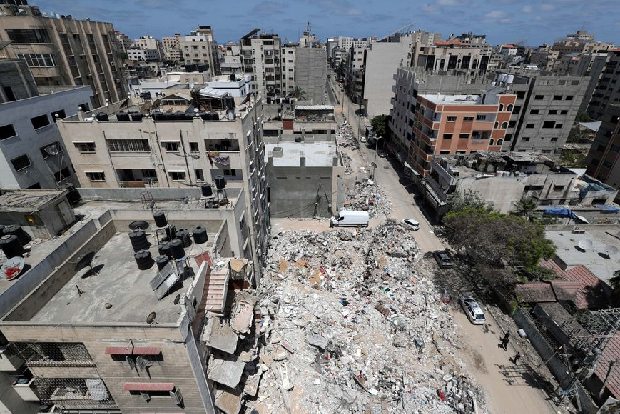Begin typing your search...
To focus on Hamas is to miss the point
What’s so hard for people to understand? Home is a universal concept, isn’t it? You only have one home, and it’s precious. So why are some people still rotely saying that the situation in Gaza is complicated, or that it’s about religion? For many of us, it’s neither of these things. And it’s not about Hamas either.

Chennai
President Biden’s announcement about the cease-fire on Friday emphasised the diplomatic efforts conducted with Israel, the Palestinian Authority in the West Bank and Egypt, as mediator. He said that Gaza would be rebuilt with international help and that, “we will do this in full partnership with the Palestinian Authority — not Hamas, the Authority — in a manner that does not permit Hamas to restock its arsenal.” But by pointedly excluding Hamas, the Biden administration only perpetuates the myth that Hamas is the central problem.
Hamas was democratically elected — in elections foisted upon Gaza by the Bush administration in 2006 with the blithe assumption that the mainstream secular party Fatah would win, led by the US’ proxy hard man there, Mohammed Dahlan. Years of corruption — not to mention torture and human rights abuses — meant that many Gazans had lost faith in Fatah by then and weren’t prepared to vote the way Washington wanted them to. Hamas had been a militant Islamic resistance movement, born in the late 1980s, partly from Israel’s occupation of Gaza, and since it was a highly religious party, many of us assumed that at least it would be less corrupt.
Unfortunately, we don’t get elections every four years in Gaza, and Hamas’s victory was something that Gazans soon learned to regret. Critics of the government regularly are beaten, sometimes half to death, and freedoms are restricted. But we haven’t had a chance to vote Hamas out of power; 2006 was the last election we had.
Which is perfect for the Israelis. Hamas, with its iron grip and rocket attacks, is the ideal hook on which to hang all blame. Its popularity has declined since 2006, though that has been buoyed lately — but that, too, actually is irrelevant. What Palestinians think of Hamas has nothing to do with what they think of the right to a legitimate resistance. And most of us believe in the latter. Who wouldn’t in our position? We knew the rickety rockets shot from Gaza were all that the Israel Defense Forces and Prime Minister Netanyahu needed to redirect public attention on Israeli self-defense and away from the harms inflicted on Palestinians. This isn’t Hamas’s first rodeo. And the provocation that started all this, the expulsion of Palestinians from their homes in East Jerusalem, wasn’t just a provocation. It was an attack on the very last stand of everything Palestinians have ever fought for: home.
Hundreds of thousands of Palestinians live in refugee camps, many elsewhere in the Middle East, often foregoing citizenship rights in that second country and passing on their statelessness to their children and grandchildren in the name of one thing. Home. No elected Palestinian government at this point is going to forget that and simply roll over just because some wannabe international peacemaker wants them to, for their career-boosting photo op in the Rose Garden. That’s been done already.
If any party other than Hamas were in power in Gaza right now, it might have tried to lobby for international support for the Palestinians of East Jerusalem a few days or weeks longer before launching rockets on Israel. But seeing its fellow countrymen and women made homeless, time and time again, would ultimately have forced the hand of even a non-Hamas government in Gaza, either drawing it into the fight or making it so unpopular for not getting involved that it’d be forced out of power.
That’s why to focus on Hamas is to miss the point, and to reinforce the myth that the conflict is, in some fundamental manner, about the group. The conflict is about the Israeli occupation. To focus on Hamas is also to sanitise the conflict, and in that way become complicit in it. It allows people to express sympathy for ordinary Palestinians while blaming a few people at the top of the Palestinian leadership. But the right to self-defense against Israel’s continued aggression belongs to all Palestinians; legitimate resistance cannot be a right only for those Palestinians who believe exclusively in nonviolent self-defense — not in the face of the violence we endure. We, Palestinians, are in this together.
Ghalayini is an editor from Gaza. NYT©2021
The New York Times
Visit news.dtnext.in to explore our interactive epaper!
Download the DT Next app for more exciting features!
Click here for iOS
Click here for Android
Next Story



